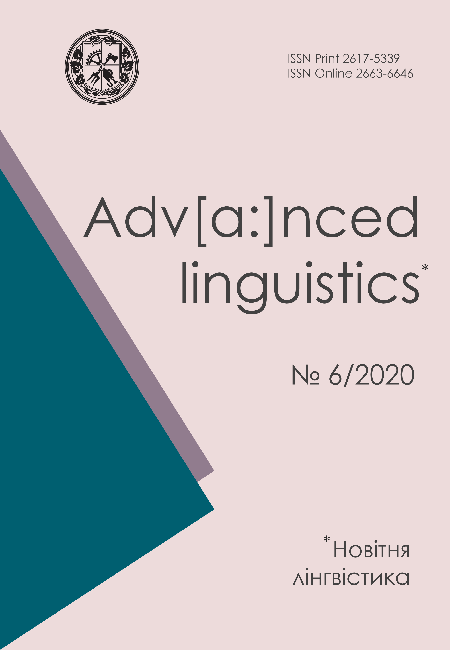METHODOLOGY OF STUDYING SPECIALIZED LANGUAGES
DOI:
https://doi.org/10.20535/2617-5339.2020.6.218009Ключові слова:
professional language, lexis, terminology, conceptionАнотація
The article presents the concept of professional language. The interest of scientists in the functional aspects of language, analysis of the features of language as a living structure, the spirit of the people and the structural material to explain the world around us are outlined. The focus is on the disclosure of the concept, systematization and analysis of existing scientific approaches to linguistics to study and consider the concept of "professional language". The work also contains information on the historical ways of formation, preconditions, use and application of professional language. Also, the term "language for special purposes" is used and explained. Leading scholars who have made a significant contribution to the field of linguistics have been singled out who in their works began to analyze professional language as a special aspect of linguistic research. Different methods of classification are analyzed and terminological features are considered. Methods of analysis of professional language within the framework of system-language, pragmalinguistic and linguistic concepts were also examined. In addition, it is stated that the term “professional language” does not have only one and final definition which allows for further research on this phenomenon. Conclusions are made and directions of further researches are outlined.Посилання
Vyskushenko S.A. (2015). Fakhova mova yak obiekt linhvistychnoho doslidzhennia [Professional language as an object of linguistic research]. Conference of Zhytomyr Ivan Franko State University. 1-4. [in Ukrainian]
Kyiak T.R., Naumenko A.M., & Ohui O.D. (2006). Teotia i praktyka perekladu (nimetska mova) [Theory and practice of translation (German)]. Vinnytsia: Nova Knuha, 586. [in Ukrainian]
Bersenev S.D. (1968). Statistika klassov slov v rechi obikhodno-bytovoi i naychnoho stilei v nemetskom yazyke. Teoria i praktika linhvisticheskoho opisania rechi [Statistics of word classes in the speech of common and scientific styles in German. Theory and practice of linguistic description of colloquial speech]. Horkyi, 127. [in Russian]
Humboldt V. (1984). Izbrannye Trudy po yazukoznaniiu: sbornik pabot [Selected works on linguistics: collection of papers]. Novhorod: Prohress, 18-20. [in Russian]
Leichik V.M. (2006). Terminovedenie. Predmet, motodu, struktura [Terminology. Subject, methods, structure]. [2nd edition, revised and enlarged]. M.: URSS, 254. [in Russian]
Morozov G.I. (2000). Rol nauki o terminakh [Role of the science in terms]. Scientific and technical terminology: scientific abstract. Cp. M. Ed.1, 34-36. [in Russian]
Kondrashov N.A. (1967). Prazhskii lingvisticheskii kruzhok: sb. statei [Prague Linguistic Circle: collection of articles]. Moscow: Prohress, 560. [in Russian]
Superanskaia A.V., Podolskaia N.V., & Vasileva N.V. (1989). Obshchaia terminologiia. Voprosu teorii [General terminology. Questions of theory]. M. Nauka, 246. [in Russian]
Fluck H.-R. (1996). Fachsprachen: Einführung und Bibliographie. Tübingen. Basel: A. Francke Verlag, 361.
Hoffmann L. (1985). Kommunikationsmittel Fachsprache. Eine Einführung. [2 Auflage. Durchges]. Tübingen : Gunter Narr Verlag. 307.
Roelcke T. (2005). Fachsprachen. Berlin: Erich Schmidt Verlag GmbH. 250.
##submission.downloads##
Опубліковано
Номер
Розділ
Ліцензія
Наше видання використовує положення про авторські права CREATIVE COMMONS для журналів відкритого доступу.
Автори, які публікуються у цьому журналі, погоджуються з наступними умовами:
1. Автори залишають за собою право на авторство своєї роботи та передають журналу право першої публікації цієї роботи на умовах ліцензії Creative Commons Attribution License, котра дозволяє іншим особам вільно розповсюджувати опубліковану роботу з обов'язковим посиланням на авторів оригінальної роботи та першу публікацію роботи у цьому журналі.
2. Автори мають право укладати самостійні додаткові угоди щодо неексклюзивного розповсюдження роботи у тому вигляді, в якому вона була опублікована цим журналом (наприклад, розміщувати роботу в електронному сховищі установи або публікувати у складі монографії), за умови збереження посилання на першу публікацію роботи у цьому журналі.

